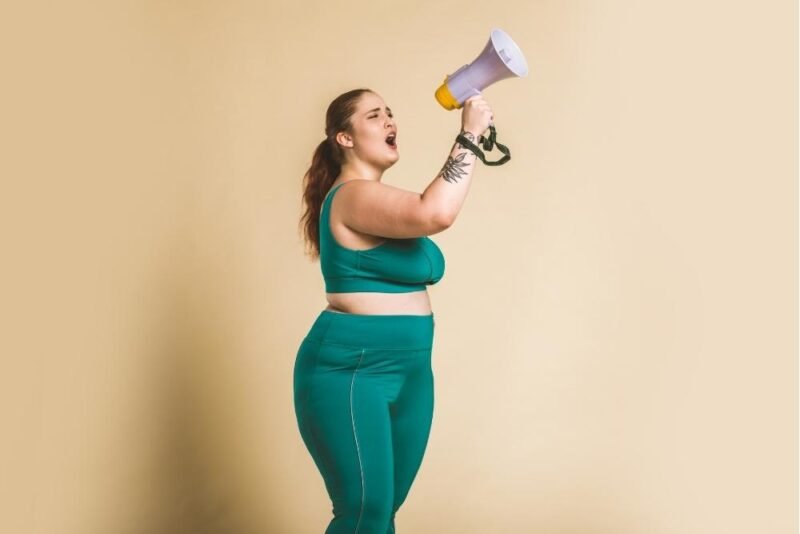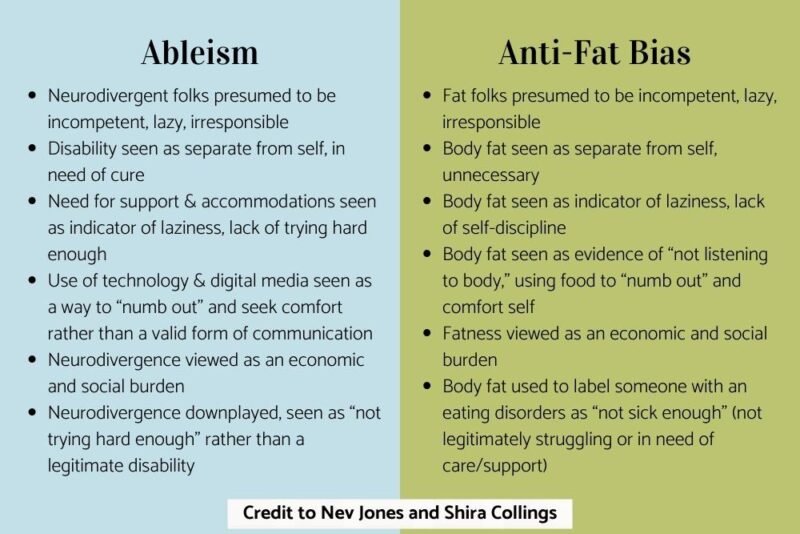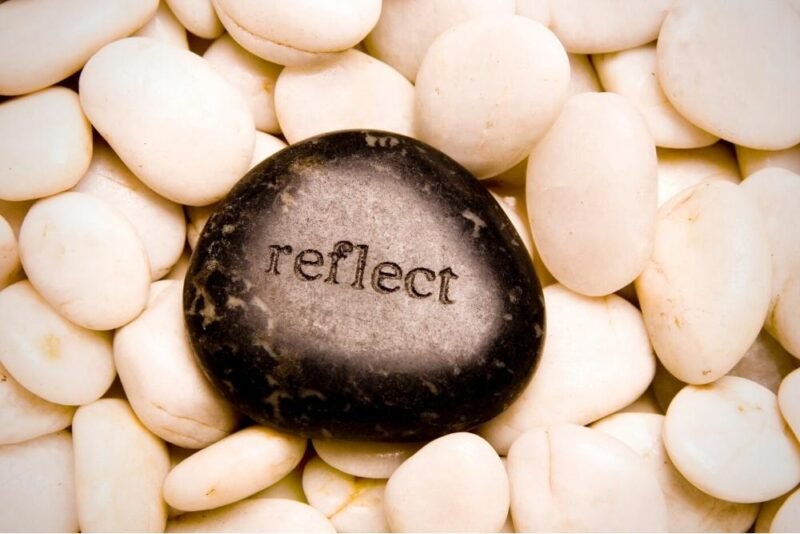
The matter of this web site submit is one I only commenced to investigate myself in the previous yr or so. I was stunned, at initial, when it sunk in how ableist diet program culture is, with healthism and anti-fatness/sizeism as the backlinks. I recognized how ablest (and healthist) my personal contemplating was back when I was deeply enmeshed in diet program culture, myself. And now that I see this darker aspect of diet society, I just can’t unsee it, and I want you to see it, way too.
Food plan culture is just 1 of quite a few social units in which individuals are taken care of inequitably. It typically overlaps not just with ableism, sizeism and healthism, but also with racism, sexism, ageism and classism.
Diet program society supports interpretations of particular wellness decisions as ethical character — it’s not just about body weight decline. Diet plan culture does not assist the worth of all bodies, and diet regime lifestyle does not exist in a vacuum.
Even if you don’t take into account oneself to be on a “diet,” due to the fact you stay in diet regime society, you will nonetheless have thoughts, beliefs and behaviors — mindful or unconscious — that have been strongly influenced by food plan society. Except you do the work to free on your own, of study course.
Intently connected to eating plan culture is exercise tradition, which, not remarkably, is also healthist and ableist, sending delicate or not-so-refined messages that exercise really should be employed to “overcome” or keep away from disability, simply because disabled bodies have significantly less price.

What is “disability”? What is “ableism”?
So, what do I indicate when I say “disabled”? I’m not only conversing about needing to use a wheelchair, a walker, a cane or other mobility help equipment. Disabilities can be obvious, or not obvious. A person with a overall health problem that has an effect on their strength, endurance or mobility would be disabled, and that may not be solely obvious. Or, somebody could be neurodivergent, which typically is invisible.
“Neurodivergent” is phrase for individuals with cognitive and/or neurological processes that vary from what is thought of — by cultural/societal and medical requirements — to be “typical” or “normal.” This incorporates folks with autism, ADHD, anxiousness, melancholy and borderline identity, as very well as men and women who are very sensitive to sensory stimulation.
I identified this definition by attorney and social justice activist Talila “TL” Lewis to be specific and highly effective:
“A procedure of assigning worth to people’s bodies and minds based on societally produced tips of normalcy, efficiency, desirability, intelligence, excellence, and physical fitness. These produced thoughts are deeply rooted in eugenics, anti-Blackness, misogyny, colonialism, imperialism and capitalism.
“This systemic oppression qualified prospects to individuals and culture identifying people’s price dependent on their culture, age, language, visual appearance, faith, birth or dwelling area, “health/wellness,” and/or their capability to satisfactorily re/deliver, “excel” and ‘behave.’
“You do not have to be disabled to practical experience ableism.”
What ablism and anti-fatness/sizeism have in common is the excellent — held by the health care program and modern society at significant — that currently being extra fat and being disabled are the two abnormalities that the particular person ought to get the job done tricky to get over. Also, that owning a entire body that is irregular in this way signifies that you are not typical, and not rather human. [Note that I use the word “fat” as a neutral descriptor, like short or tall.]
Which is comprehensive and utter bullsh*t.

A very first seem at ableism and anti-body fat bias
Just as you never have to be disabled to experience ableism, you never have to be excess fat to expertise anti-fat bias. If you are a thin particular person who meal plans or exercise routines to continue being skinny, it’s at least in aspect simply because you are fearful of turning out to be extra fat. It may possibly also simply because you are frightened of getting to be “unhealthy” or suffering from a decline of mobility.
I’ve had clients in greater bodies who also transpire to have some mobility issues notify me how crucial it was for them to test to wander or transfer “normally.” This is significantly less about how motion feels in their human body, and much more about how they may well be judged by other if they are body fat AND they stroll gradually. I have also experienced neurodivergent shoppers in bigger bodies experience enhanced strain to mask signs of their neurodivergence.
Systemic oppression dependent on no matter if a person adheres to societal beliefs of “normalcy” and “intelligence” impacts disabled and neurodivergent persons, as nicely as unwanted fat people. This can incorporate:
- Focusing on cutting down “symptoms” of neurodivergence — or on dropping weight — as a result of nourishment interventions.
- Looking at neurodivergence — or “excess” entire body excess fat — as one thing to “cure.”
- Concentrating only on how neurodivergent and fats folks can cope in an ableist/anti-extra fat globe alternatively of concentrating on building the planet additional accessible and friendly to a varied vary of people.
On that previous point, men and women dwelling in extra fat bodies could have trouble obtaining attractive garments (or any outfits that are not custom made-produced) that fit. They might dread likely to places to eat, theaters or on airplanes due to the fact they know (or aren’t certain) if the chairs or seat will accommodate their bodies. People today dwelling with a actual physical incapacity may possibly also have problems finding apparel and seats (or whole buildings) that are designed to fulfill their wants.

How healthism performs a connecting purpose
Healthism is a philosophy that overemphasizes unique responsibility in wellness results and prioritizes pursuing health higher than all else. This can include things like:
- Demonizing consuming for satisfaction, joy, ease and comfort, or stimulation. (There should be no disgrace in discovering pleasure/pleasure/convenience from food items, and foodstuff can be an critical type of stimulation, or stimming, for some neurodivergent people.)
- Shaming people for picking out advantage foodstuff, irrespective of the actuality these meals may be enjoyable, and may possibly be a conserving grace for hectic folks as nicely as people who locate it challenging mentally or bodily to prepare dinner a food “from scratch.”
- Viewing overall health (and the pursuit of well being) as a ethical obligation.
I have a ton to say on that very last issue, but let’s commence by pointing out what may possibly be apparent: Several folks are (reluctantly) prepared to give fats people today a pass “as extended as they’re healthful.” This is aspect of the “great fatty” trope — be active, interesting and effective, and never accept your present-day overall body as Okay. (If you’re fat and dare to like you, somebody might accuse you of “glorifying obesity.”
I have had a lot of clientele in bigger bodies explain to me they really feel they need to have to search like they are hoping to lose pounds or “get healthy” — ordering the salad, likely to the fitness center, bragging about their fantastic cholesterol and blood sugar stages — even when they are in the process of unsubscribing from eating plan tradition and building peace with food items and their bodies.
When another person “concern trolls” a unwanted fat individual on social media (or somewhere else), what do they say? Usually one thing like, “but you are not healthy” or “you’re heading to get diabetes.” Yep, ableism (and healthism) are inherently baked into anti-fatness.
Even though it’s real that bodyweight and health are not carefully connected (affiliation does not confirm causation), I’ve arrive to abide by statements I make about that stage with an additional assertion that can be even thoughts-blowing: staying nutritious and/or pursuing well being is not a moral imperative.
Mic drop.

Well being is not a promise, or a evaluate of worthiness
Quite simply, “health,” as it is ordinarily outlined, is not a source that is offered to anyone. Some persons in no way have that useful resource. Other persons intermittently have it. Continue to other men and women have it for a though, then never have it, and hardly ever have it once again.
Like it or not, if we are fortunate adequate to dwell long enough, factors are likely to occur to our bodies. We may come across that our joints ache, that we acquire bodyweight, that our blood strain traits bigger, that we need to use a walker or a wheelchair, that we get most cancers. Our bodies are no fewer worthy. We are no much less worthy.
When I was however executing “non-diet plan excess weight management” (which I ultimately understood was not a matter) I would typically assistance clients established “meaningful” targets. In other phrases, rather of utilizing fitting into “skinny jeans” as a aim, we would use “keeping up with your kids” as a aim. Yep, which is absolutely ableist. Some mother and father will under no circumstances be capable to “keep up with” their kids or get down on the flooring to perform with their children. That does not make them bad or ineffective moms and dads.
Extra fat people and neurodivergent people have often existed, so alarmist headlines (and the community wellness machinations driving them) about the “ob*sity epidemic” or the “autism epidemic” actually spread the strategy that everyone who diverges from what has been labeled “normal” need to be eliminated or erased. We observed this clearly in one particular not-so-charming chapter of our country’s background involved what had been recognized as “ugly laws.”
From 1867 to the commencing of World War I, some U.S. cities enacted so-termed “ugly laws” banning individuals considered “diseased, maimed, mutilated or in any way deformed so as to be an unsightly or disgusting object or poor person” from public spaces. Whilst these legislation became less enforced in excess of time, Chicago did not repeal its “ugly law” until finally 1974, when an alderman took up the lead to, calling the regulation “cruel and insensitive” and “a throwback to the Middle Ages.”

A next search at ableism and anti-fatness
For this section, and the graphic higher than, I give major credit to psychological well being researcher and professor Nev Jones and therapist Shira Collings, who gave a discuss with each other at an RDs for Neurodiversity convention I attended previously this year.
They reported the concept of “excess” is an underlying thread beneath anti-fats bias and ableism. System unwanted fat/fatness is observed as surplus body tissue, and as a end result of extreme having. The concept is also that the human body itself is practically “excess” – that entire body dimension is independent of who we are. Very same with neurodiversity – disability and disability lodging as an “excess,” lodging as needless.
Equally extra fat and neurodivergent persons experience objectification and disempowerment, as they are not seen as the gurus on their personal desires. I think this is correct for folks who have other forms of disability, as very well.
Jones and Collings pointed out that neither entire body fats or neurodivergence are issues that want to be treated or eliminated, and that our bodies are components of our minds and ourselves.
- Our cognition (thinking) is motivated by our bodies, and bodyweight suppression can have a important unfavorable affect on our imagining.
- When somebody is within their set position range—which could include staying fat—this is vital and in fact essential to how they functionality and who they are.
There’s some really serious food for believed there.

So now what? Ways to reflect
Did this article feel like a large amount? If it did, that is Okay. I hope it opens a doorway to discovering your have ideas, emotions, beliefs and assumptions about what bodies (and minds) are worthy and important. Listed here are some concerns to get you pondering:
- What means of staying various get labeled as “bad” or “inferior” in our society? Do you agree or disagree with these labels?
- In what approaches do you label other people as being fewer worthy? Do you truly feel like you do this consciously, or unconsciously (like probably you absorbed these tips from society but haven’t actually examined or questioned them)? How are these people today distinctive from you? Do you see any anxiety that you could possibly sometime be like these people?
- Ought to men and women have to improve their bodies or minds to “fit in,” or need to our culture and its devices evolve to be far more inclusive of all types of folks?
- Do you decide (consciously or unconsciously) folks who are “unhealthy”? Do you make a difference in between owning a ailment or incapacity that is “preventable” vs. a person which is not? Why?
- Do you believe it’s a ethical very important to go after health? Why or why not? If you do, how does this align (or conflict) with other beliefs you have about overall body autonomy?
- Do you think that we have personalized control about our overall health? If indeed, can you consider of any or examples where by which is not the scenario?
- If you know that you choose people centered on their size, skill, health and fitness or other things, how does that make you truly feel? Have you been judged by many others (or by yourself) centered on anything about you that is diverse? How did that make you truly feel?
- Do you stand opposed to some types of oppression (say, racism) but locate that you permit other forms of oppression slide by? Why?
Some of these questions might reveal answers about yourself that make you cringe. If so, that’s Okay. Strategy them with curiosity and self-compassion, and if you uncover that you have some beliefs or mindsets that want to transform, then get started to adjust them. If we are not mindful of our views, emotions, beliefs and behaviors, then we stay trapped. Consciousness (yet again, paired with curiosity and self-compassion) opens the door to knowing much better, and performing improved.
Carrie Dennett is a Pacific Northwest-based registered dietitian nutritionist, freelance author, intuitive ingesting counselor, creator, and speaker. Her superpowers involve busting diet myths and empowering ladies to really feel far better in their bodies and make foods options that aid pleasure, nutrition and wellness.
 Print This Write-up
Print This Write-up





More Stories
Healthy Meal Ideas: Green Herbs For Laksa Soup And Pasta Dishes
What Wise Guys Eat
Historical Sites in Italy – Bologna